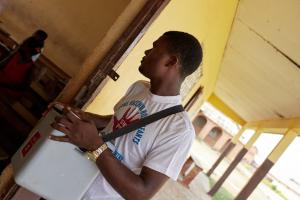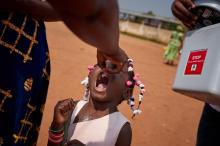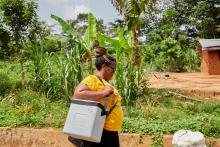Republic of Congo steps up polio vaccination in border region
Ouesso, (Congo), 11 February 2020 - Under a sultry and showery sky, small teams fanned out across villages in Sangha, a department in the far north of Republic of the Congo, vaccinating children against wild poliovirus in the country’s latest campaign to boost immunization and suppress the risk of cross-border transmission.
Sangha borders Cameroon and Central African Republic, where circulating vaccine-associated poliovirus was detected in 2019. Vaccinator Yvonne Komba and her team visited over 16 villages and vaccinated more than 30 children on the third and last day of the campaign. Unlike years past, Ms Komba recounted, communities are more receptive to vaccinations thanks largely to public health education and regular immunization campaigns.
“Parents are now conscious about the dangers of failing to vaccinate children against polio,” said Ms Komba, but pointed out that at times they have worked with village leaders when some families refuse to have their children immunized.
Mother of two Christelle Bangondo readily brought her children for vaccination when Ms Komba’s team came to her village, saying she trusted vaccines after a previous immunization against diphtheria, tetanus and whooping cough made her children less prone to coughing.
Low immunization risks
Congo’s last major wild polio outbreak was in 2010. The poliovirus type 1 (there are three types) epidemic infected more than 180 people and killed 85, mostly in the Atlantic port city of Pointe Noire in an outbreak found to be linked to one that was going on in neighbouring Angola. The majority of the infections and deaths were in people over 15 years.
No outbreak of such scale has since occurred in Congo. The country has stepped up polio control measures, but the rate of vaccination was still below 80% in 2019, although up from 68% the year before. Low immunization coverage and poor sanitation puts Congo at risk of circulating vaccine-derived poliovirus
In such settings the virus excreted by children after oral polio vaccination can be transmitted, leading to genetic changes and emergence of circulating vaccine-derived poliovirus. When enough people in a community are immunized, the virus is deprived of susceptible hosts and will die out. High levels of vaccination coverage must be maintained to stop transmission and prevent outbreaks. The virus can easily be imported into a polio-free country and can spread rapidly amongst unimmunized populations. So far Congo has not had a vaccine-derived poliovirus case.
The vaccination drive in Sangha targeting more than 24 000 children was the second in 2019. A countrywide one was held six months earlier. Two campaigns are planned in 2020. The mass immunizations are in addition to routine vaccinations.
Dr Edouard Ndinga, who heads the polio programme at World Health Organization in Congo, noted that the country’s current polio vaccination rate “does not ensure full immunity for all children.”
Weak public health system, inadequate personnel, logistical challenges and difficulty in reaching some localities are among the impediments to comprehensive polio vaccination efforts in Congo.
Polio has no cure. It can only be prevented. The polio vaccine can protect a child for life.
At the end of the campaign in Sangha, more than 19 000 children were vaccinated. Some far-flung localities were, however, not reached due to logistical difficulties. “The response by the communities during the vaccination campaign was impressive,” said Dr Rene Malhela, director of the public health department in Sangha. A few months before the vaccination drive, four suspected polio cases were reported in Sangha, but they turned out negative, Dr Malhela said, pointing out that educating the population, disease surveillance and vaccinations have helped curb the virus.
“It’s been more than 20 years since we had a child paralysed by polio. Vaccinations have made a huge impact. said Dr Malhela.
The world has made major progress towards wild polio eradication. In October 2019, an independent expert commission certified wild poliovirus type 3 as eradicated. Type 2 has been eradicated.
This year, Africa is on the cusp of a monumental public health success. With no cases of wild polio virus type 1 reported since August 2016, the region is on track to be certified to have eradicated wild polioviruses in 2020.
Senior Editor/Writer
Email: ottob [at] who.int
Communications and marketing officer
Tel: + 242 06 520 65 65 (WhatsApp)
Email: boakyeagyemangc [at] who.int





